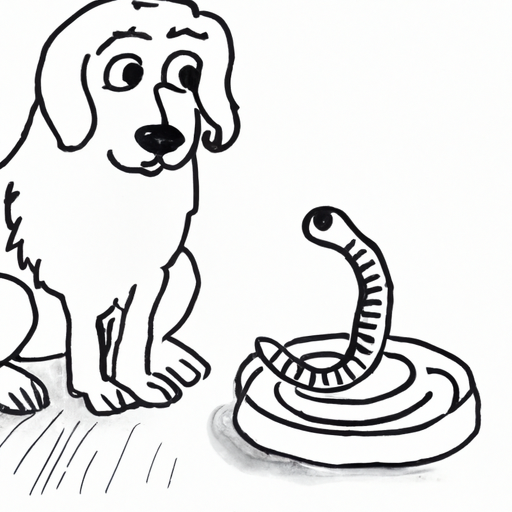As a dog owner, your pet’s health is paramount. Roundworms are parasites that can pose a significant threat to your dog’s health and well-being. Understanding the impact of these parasites can help you protect your canine companion from potentially harmful outcomes.
Table of Contents
- What are Roundworms?
- How Do Dogs Get Infected with Roundworms?
- Signs and Symptoms of Roundworms in Dogs
- Diagnosis and Treatment of Roundworms in Dogs
- Preventive Measures
- Frequently Asked Questions
Key Takeaways
- Roundworms are common parasites that can infect dogs, leading to various health problems.
- Dogs can get infected by ingesting contaminated soil, eating infected rodents, or from their mother’s milk.
- Common symptoms include stomach upset, weight loss, dull coat, and coughing.
- Roundworms can be diagnosed by a fecal flotation test and are treatable with deworming medication.
- Prevention includes regular fecal testing, deworming, and avoiding areas with high parasite contamination.
What are Roundworms?
Roundworms, scientifically known as Toxocara canis, are among the most common parasites found in dogs, particularly puppies. They have a spaghetti-like appearance, usually measuring 3-5 inches long.
These parasites live in a dog’s intestines and feed off the nutrients the dog consumes. If left untreated, a heavy roundworm infestation can lead to severe health complications, including intestinal blockage or rupture, poor growth, and even death.
How Do Dogs Get Infected with Roundworms?
Dogs can get infected with roundworms in various ways. Puppies can get them from their mother’s milk, especially if the mother was infected during pregnancy. Dogs can also get roundworms by ingesting soil contaminated with roundworm eggs or by consuming infected rodents.
It’s worth noting that roundworm eggs can survive in the environment for years, making it crucial to maintain a clean environment for your dog. Some helpful tips on maintaining cleanliness can be found in this blog post from OneTopDog.
Signs and Symptoms of Roundworms in Dogs
A roundworm infection can lead to a variety of symptoms in dogs. These may include:
- Potbelly appearance: Infected puppies often develop a swollen stomach due to a large number of worms.
- Weight loss: Despite a good appetite, dogs may lose weight because the worms are absorbing the nutrients.
- Dull coat: Lack of nutrients can lead to a dull, lifeless coat.
- Coughing and respiratory distress: Some roundworm larvae migrate to the lungs, causing coughing and respiratory issues.
- Diarrhea or vomiting: Dogs may experience digestive problems, often accompanied by visible worms in the feces or vomit.
If you notice any of these symptoms, it’s essential to consult your vet immediately. On that note, here is a helpful guide on how to find a good vet for your dog.
Diagnosis and Treatment of Roundworms in Dogs
Diagnosis of roundworms in dogs is typically done through a fecal flotation test. This test involves examining a sample of your dog’s stool under a microscope to check for the presence of roundworm eggs.
Once diagnosed, your vet will prescribe a deworming medication to kill the roundworms. This treatment may need to be repeated several times to ensure all worms and their larvae are eliminated.
After treatment, it’s crucial to prevent re-infestation. You can do this by maintaining a clean environment, regular deworming, and periodic fecal testing. Learn more about dog health and wellness to keep your furry friend in the best shape possible.
Preventive Measures
Prevention of roundworms involves several steps:
- Regular fecal testing: This helps catch any infestation early before it causes serious health issues.
- Deworming: Regular deworming, as recommended by your vet, can help keep roundworms at bay.
- Hygiene: Maintain a clean environment to minimize the risk of your dog ingesting roundworm eggs.
- Avoid contaminated areas: Keep your dog away from areas known to have a high parasite load, such as dog parks or unclean yards.
Frequently Asked Questions
Q: Can humans get roundworms from dogs?
A: Yes, humans can get roundworms from dogs, especially children who may play in contaminated soil and put their hands in their mouths. It’s vital to maintain good hygiene and regularly deworm your pets.
Q: How often should I deworm my dog?
A: Puppies should be dewormed every two weeks from two weeks of age until they are three months old, then monthly until they are six months old. After six months, dogs should be dewormed every three months. However, your vet may recommend a different schedule based on your dog’s risk factors.
Q: Can I prevent my dog from getting roundworms?
A: While it’s hard to completely prevent roundworms, following the preventive measures outlined in this article can significantly reduce your dog’s risk.
Q: What should I do if I think my dog has roundworms?
A: If you suspect your dog has roundworms, consult your veterinarian immediately. They can perform a fecal test to confirm the presence of roundworms and prescribe appropriate treatment.
In conclusion, roundworms are a common but treatable health issue in dogs. By understanding what they are, how dogs get them, and the signs to look out for, you can better protect your furry friend from these parasites. Remember, prevention is always better than cure, so always maintain good hygiene and regularly consult with your vet for check-ups and deworming.



